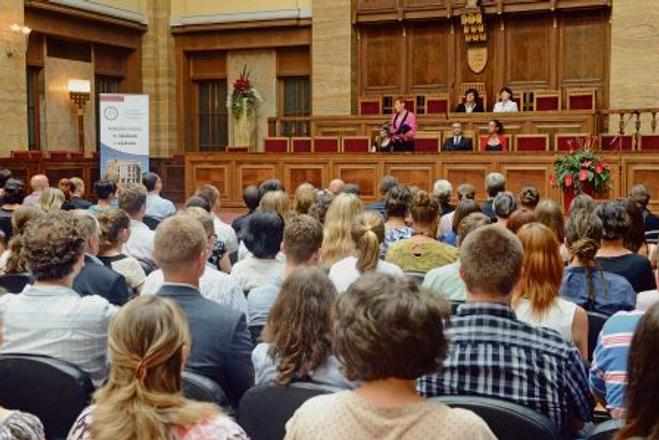The article claims that it takes about 12 years to become fluent in Slovak. I cannot confirm the data used to support that claim, but as I'm on my fourth year learning the language, I can say that this estimate is on the positive side. Yes, it's challenging, but it's rewarding too.
The reasons why we learn the language vary in the expat community, from studies, relationships, to simply looking for a new challenge. From experience, not many are able to continue beyond a few courses, most people say that time commitments stop them from taking classes, but in a certain way Slovak is not a language that gives you an instant gratification of understanding a conversation after a few lessons, and this fact is frustrating at first, when you can't see the results.
When I first arrived to Slovakia, many people told me that a high percentage of people speak English therefore you can manage life without learning the language, This is true to some extent, but after my first year I realized that there is so much more to learn about the culture and its people when I can speak Slovak with them. Emotions tend to be suppressed when you speak in a different language than your own, and, well, I also grew tired of having my personal translator with me everywhere I went.
Most Slovaks understand the complexity of their language. Some people have been quite happy to learn that I'm studying their language, others simply ask me why. Certainly, the number of Slovak speakers is low and if you are not planning to live in Slovakia for many years, then probably the usefulness of the language can be questioned. I like to see it from a different point of view: that I will be able to understand this country's people and customs better. Also, by learning this language I can theoretically understand similar Slavic languages. And because I like the challenge.
A few weeks ago we were waiting to order our food in a restaurant. Our waitress informed us in basic English that the staff was quite busy at the moment and that we will have to wait a bit longer. To my table companions, this statement was one of the rudest comments they ever heard from a waitress and they started complaining about customer service in the country. But in this case certainly it was a matter of misunderstanding, to most Slovaks I met, if they are not fluent in English, they tend to be a bit nervous and want to finish the conversation sooner than they should. That's another good reason for us to learn Slovak too.
After four years of studying, the benefits are appearing at last for me. I can't say it takes this long to everyone, and much depends on one's personal environment. People who arrives to Slovakia sometimes ask me about learning the language, and I tell them to take their time. It's not an easy language, but you will certainly be happy about the results.
By Diego Loyola - InterNations Ambassadors Bratislava

 Opening of the summer course of Slovak language, illustrative. (source: TASR)
Opening of the summer course of Slovak language, illustrative. (source: TASR)